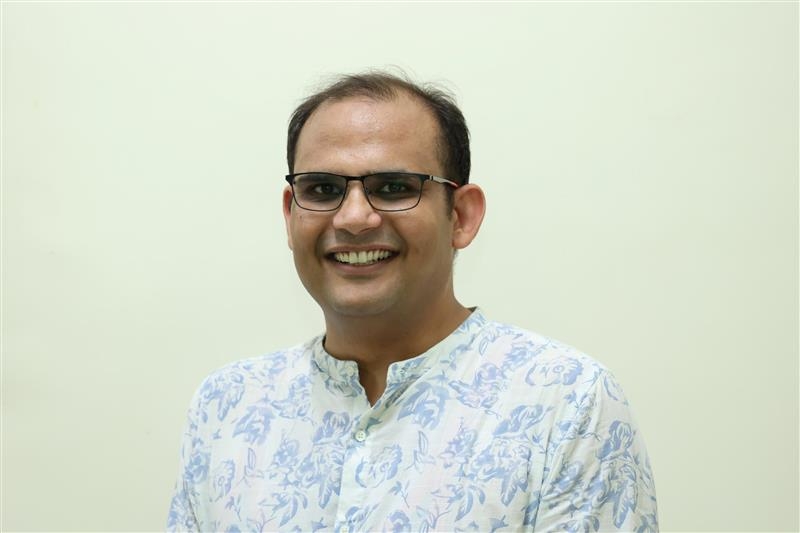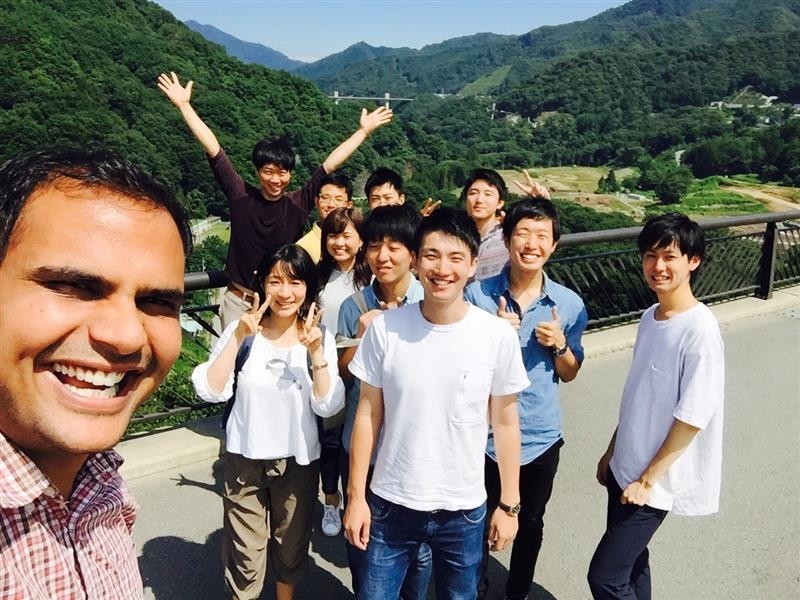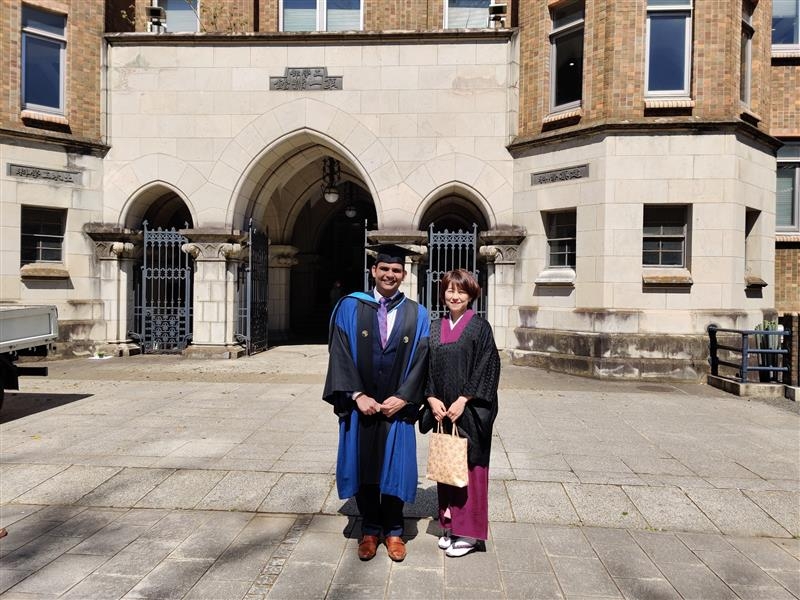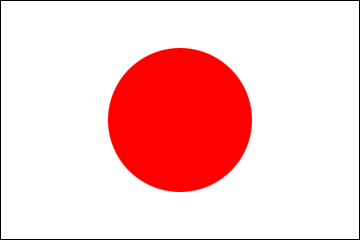Voices of MEXT Alumni
2025/9/25
Introduction

Learn from MEXT alumni about their experience on campus, and how the scholarhip program has helped their professional development, in their own words!
Full Name: Nikhil Bugalia
From: Indian Institute of Technology Madras, Chennai
University in Japan and Period of Study in Japan: The University of Tokyo, 2015-2020
Degree: Master’s and PhD
Current designation: Assistant Professor, Civil Engineering, IIT Madras
My name is Nikhil Bugalia. I am currently working as an Assistant Professor at the Department of Civil Engineering at IIT Madras. I come from Jaipur, the capital of Rajasthan. I completed my B. Tech degree in Civil Engineering from IIT Kanpur in 2013. Worked as a Data Analyst for 2 years, before moving to Japan to pursue my master’s and PhD degrees from the University of Tokyo in 2020.
Full Name: Nikhil Bugalia
From: Indian Institute of Technology Madras, Chennai
University in Japan and Period of Study in Japan: The University of Tokyo, 2015-2020
Degree: Master’s and PhD
Current designation: Assistant Professor, Civil Engineering, IIT Madras
My name is Nikhil Bugalia. I am currently working as an Assistant Professor at the Department of Civil Engineering at IIT Madras. I come from Jaipur, the capital of Rajasthan. I completed my B. Tech degree in Civil Engineering from IIT Kanpur in 2013. Worked as a Data Analyst for 2 years, before moving to Japan to pursue my master’s and PhD degrees from the University of Tokyo in 2020.
Q & A
 Field trip to Yamba Dam in Japan
Field trip to Yamba Dam in Japan
 My host mother from the University of Tokyo's Host Family Program on my PhD Graduation
My host mother from the University of Tokyo's Host Family Program on my PhD Graduation
Q. What attracted you to study in Japan?
A. The most attractive part of studying in Japan was the full scholarship available for a master’s degree, which is still rare in any country worldwide. This allowed me to pursue higher studies without financially straining my family. I took the advice from my mentor at IIT Kanpur, Professor Sudhir Misra, who also completed his PhD at the University of Tokyo. Prof. Misra had suggested that going to Japan offers a very different perspective as a civil engineer, where the sense of public welfare is deep-rooted in every aspect of the civil engineers' work. This perspective was also very attractive to me.
Q. If you could give one piece of advice to your younger self for taking MEXT exams, what would it be?
A. I would advise being better prepared for the interviews by clearly explaining what kind of program (research lab, professor name, university) I would like to pursue and why. Also, I would advise myself to be very thorough in the details with the courses and the project work I did during my bachelor’s degree, as most technical questions in the interviews are based on past work.
Q. What are some must-do preparations before arriving in Japan (logistics, finance, paperwork)?
A. As an Indian student coming to Japan, I know that food is one of the first concerns to be addressed. It always helps if one learns a bit of cooking before coming to Japan, so that you don’t have to rely on outside food as often. Most ingredients are readily available. For the first few months, it is essential to have a Forex Card or a Credit Card, which can help you get your mobile connection, survive for 1st Month (till the stipend arrives).
Q. What daily habits or tools helped you manage time and stress as a student in Japan?
A. Daily exercise was a great help to keep me centered during the stressful time of my PhD. One habit that helped me always was to plan my following day tasks, things I would try in my research before going to bed. The goal was not to achieve all the plans for the next day, but at least find focus on things to do when you start the next day, because as a PhD student, you have so many varieties of things that need to be done every day.
Q. In what ways has your impression of Japan changed since going to Japan?
A. Despite a perceived language and cultural barrier before going to Japan, I was impressed by how easy it is to manage things in Japan. One is due to the extensive efforts everyone in Japan makes to communicate things clearly, through pictorials, nice illustrations, etc. Second is the warmth of the people who go out of their way to make your life comfortable. The food variety has also tremendously improved in Japan, and I genuinely believe Japan will be an extremely safe and convenient place for all Indian students.
Q. Were there any cultural misunderstandings you encountered, and how did you handle them?
A. One of the most significant cultural misunderstandings in Japan is the inability of the people to say “No” in any context. You rarely hear an explicit “No” in social and formal conversations. Instead, there will be a lot of indirect ways to reflect the negative preference around a specific option being suggested. However, identifying this is very important, especially as a student seeking guidance from your professors. One thing that helps is not to assume and ask explicit questions, seek clarifications, etc.
Q. What helped you most in adjusting to Japanese culture and daily life?
A. Finding a social group of friends was a great help. More specifically, for India, there is an association of Indian students at the University of Tokyo. The seniors who later became great friends were instrumental in adjusting to Tokyo's busy life. Hence, I advise being social and finding friends (not necessarily Indian) as soon as possible. Various universities also create many opportunities for social interaction, and you never know where to find your friends.
Q. If you did internships or part-time work, how did you find and balance them with your studies?
A. I worked at the Asian Development Bank Institute (ADBI) as a research associate, an English teacher, and a news translator from English to Hindi for NHK Radio. When I was not doing any part-time work, I used to think very strongly that having a part-time job would derail my progress from the primary goal of my research. However, this perception changed as the success of working part-time provided confidence that also helped me to achieve things in my studies. Working at ADBI was especially helpful as the work that I was doing there was very much linked to my PhD research topic. This synergy helped, as I did not feel I was being unproductive in my research work, which is my main objective.
Q. How did your time as a MEXT scholar impact your career path?
A. I will be forever grateful to MEXT, as their financial support through a “no strings attached” scholarship allowed me to explore so many things freely, which helped me finally find the career I wanted to choose.
Q. What are some Japanese customs or values you now sincerely appreciate?
A. Being polite helps a lot. Sometimes, in India, it surprises people when I am being extremely polite in my conversations. However, after living in Japan, I firmly believe that being polite helps navigate many conflicting social interactions with peers, juniors, and seniors much better.
Q. Please message students or researchers in your home country who may be considering studying in Japan.
A. I advise going to Japan and exploring a very different social system. The place is safe and allows in-depth exploration of a unique and impressive country's social, cultural, and technical aspects. It offers several good career opportunities. However, my advice to all the students is to think very strongly about what they want to do in their careers. Living in Japan for a long-term career still offers several social challenges (these vary from person to person). If one wants a long-term career outside Japan, one must use the scholarship opportunity to gather good exposure and prepare for a global career.
A. The most attractive part of studying in Japan was the full scholarship available for a master’s degree, which is still rare in any country worldwide. This allowed me to pursue higher studies without financially straining my family. I took the advice from my mentor at IIT Kanpur, Professor Sudhir Misra, who also completed his PhD at the University of Tokyo. Prof. Misra had suggested that going to Japan offers a very different perspective as a civil engineer, where the sense of public welfare is deep-rooted in every aspect of the civil engineers' work. This perspective was also very attractive to me.
Q. If you could give one piece of advice to your younger self for taking MEXT exams, what would it be?
A. I would advise being better prepared for the interviews by clearly explaining what kind of program (research lab, professor name, university) I would like to pursue and why. Also, I would advise myself to be very thorough in the details with the courses and the project work I did during my bachelor’s degree, as most technical questions in the interviews are based on past work.
Q. What are some must-do preparations before arriving in Japan (logistics, finance, paperwork)?
A. As an Indian student coming to Japan, I know that food is one of the first concerns to be addressed. It always helps if one learns a bit of cooking before coming to Japan, so that you don’t have to rely on outside food as often. Most ingredients are readily available. For the first few months, it is essential to have a Forex Card or a Credit Card, which can help you get your mobile connection, survive for 1st Month (till the stipend arrives).
Q. What daily habits or tools helped you manage time and stress as a student in Japan?
A. Daily exercise was a great help to keep me centered during the stressful time of my PhD. One habit that helped me always was to plan my following day tasks, things I would try in my research before going to bed. The goal was not to achieve all the plans for the next day, but at least find focus on things to do when you start the next day, because as a PhD student, you have so many varieties of things that need to be done every day.
Q. In what ways has your impression of Japan changed since going to Japan?
A. Despite a perceived language and cultural barrier before going to Japan, I was impressed by how easy it is to manage things in Japan. One is due to the extensive efforts everyone in Japan makes to communicate things clearly, through pictorials, nice illustrations, etc. Second is the warmth of the people who go out of their way to make your life comfortable. The food variety has also tremendously improved in Japan, and I genuinely believe Japan will be an extremely safe and convenient place for all Indian students.
Q. Were there any cultural misunderstandings you encountered, and how did you handle them?
A. One of the most significant cultural misunderstandings in Japan is the inability of the people to say “No” in any context. You rarely hear an explicit “No” in social and formal conversations. Instead, there will be a lot of indirect ways to reflect the negative preference around a specific option being suggested. However, identifying this is very important, especially as a student seeking guidance from your professors. One thing that helps is not to assume and ask explicit questions, seek clarifications, etc.
Q. What helped you most in adjusting to Japanese culture and daily life?
A. Finding a social group of friends was a great help. More specifically, for India, there is an association of Indian students at the University of Tokyo. The seniors who later became great friends were instrumental in adjusting to Tokyo's busy life. Hence, I advise being social and finding friends (not necessarily Indian) as soon as possible. Various universities also create many opportunities for social interaction, and you never know where to find your friends.
Q. If you did internships or part-time work, how did you find and balance them with your studies?
A. I worked at the Asian Development Bank Institute (ADBI) as a research associate, an English teacher, and a news translator from English to Hindi for NHK Radio. When I was not doing any part-time work, I used to think very strongly that having a part-time job would derail my progress from the primary goal of my research. However, this perception changed as the success of working part-time provided confidence that also helped me to achieve things in my studies. Working at ADBI was especially helpful as the work that I was doing there was very much linked to my PhD research topic. This synergy helped, as I did not feel I was being unproductive in my research work, which is my main objective.
Q. How did your time as a MEXT scholar impact your career path?
A. I will be forever grateful to MEXT, as their financial support through a “no strings attached” scholarship allowed me to explore so many things freely, which helped me finally find the career I wanted to choose.
Q. What are some Japanese customs or values you now sincerely appreciate?
A. Being polite helps a lot. Sometimes, in India, it surprises people when I am being extremely polite in my conversations. However, after living in Japan, I firmly believe that being polite helps navigate many conflicting social interactions with peers, juniors, and seniors much better.
Q. Please message students or researchers in your home country who may be considering studying in Japan.
A. I advise going to Japan and exploring a very different social system. The place is safe and allows in-depth exploration of a unique and impressive country's social, cultural, and technical aspects. It offers several good career opportunities. However, my advice to all the students is to think very strongly about what they want to do in their careers. Living in Japan for a long-term career still offers several social challenges (these vary from person to person). If one wants a long-term career outside Japan, one must use the scholarship opportunity to gather good exposure and prepare for a global career.
